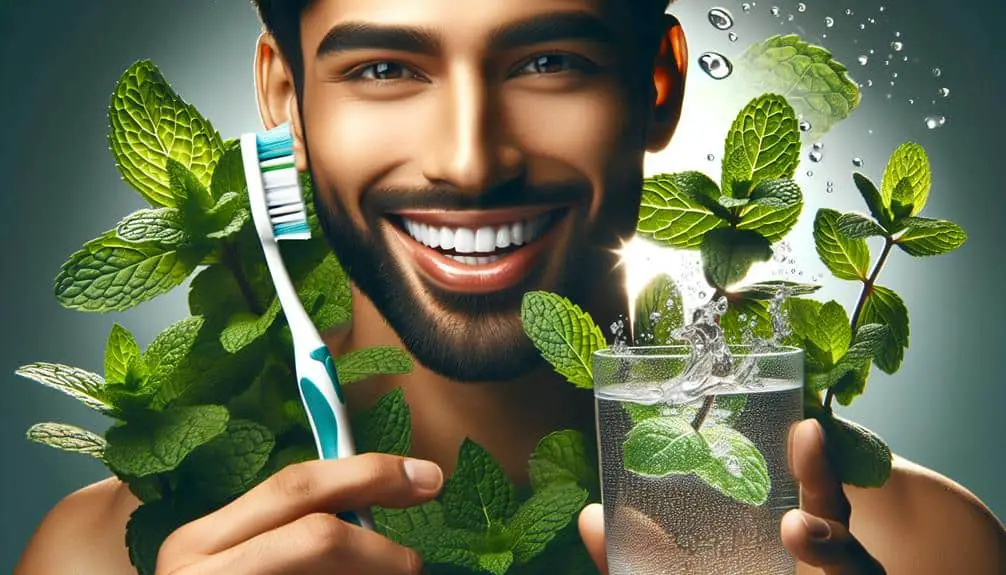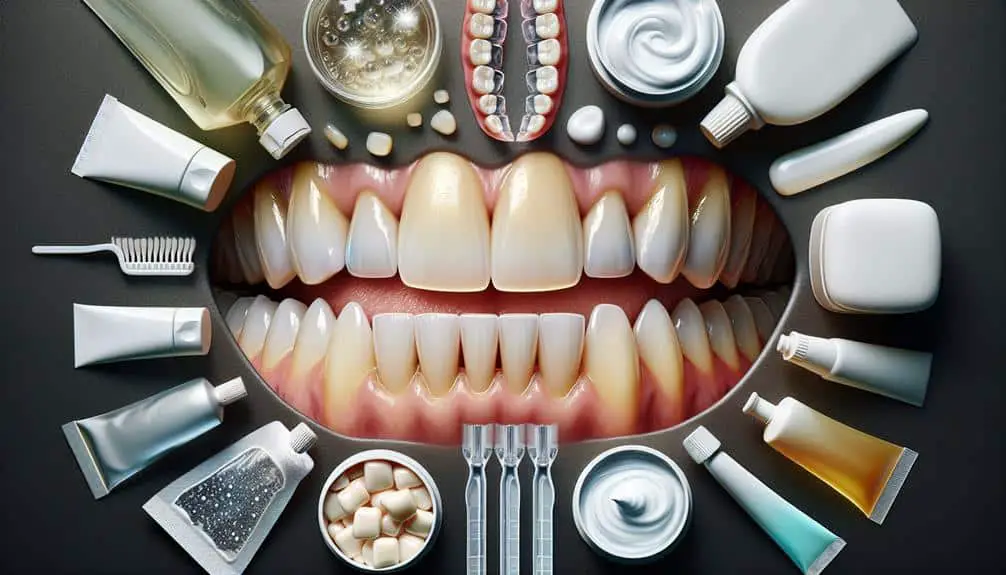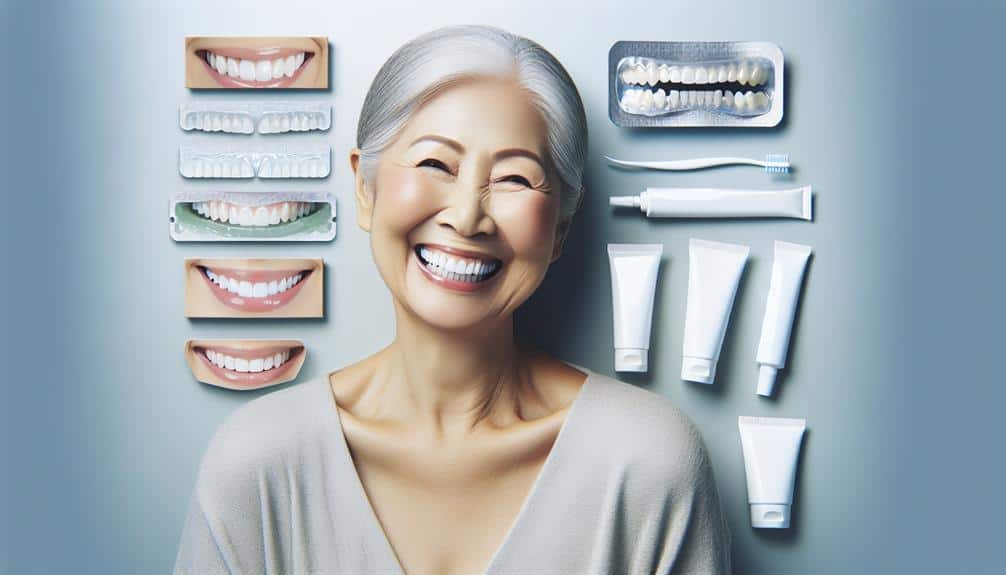To brighten your smile effectively, consider professional whitening treatments to counter the effects of aging and restore your teeth's natural whiteness. Lifestyle habits like smoking and coffee consumption can discolor teeth, but quitting smoking and rinsing after coffee can help. Eating crunchy fruits, dairy products, and green tea can naturally enhance teeth whiteness. Regular dental check-ups are essential for spotting issues early and preventing oral diseases. Additionally, natural remedies like baking soda and oil pulling can provide cost-effective solutions for a brighter smile. Explore these tips for a healthier, whiter smile.
Key Points
- Professional whitening treatments reverse aging discoloration effects.
- Avoid smoking to prevent yellow stains and gum damage.
- Rinse mouth after coffee consumption to minimize staining.
- Consume crunchy fruits, dairy, and green tea for natural whitening.
- Regular dental check-ups and DIY remedies maintain a brighter smile.
Aging and Teeth Discoloration
As you age, the natural discoloration of teeth becomes more prominent due to various factors such as enamel thinning and the accumulation of surface stains. These changes are a common part of the aging process and can be exacerbated by lifestyle habits and dietary choices.
The good news is that advancements in dental procedures and cosmetic dentistry offer effective solutions to combat these discolorations.
Dental procedures such as professional whitening treatments can help reverse the effects of aging on your teeth. These treatments are safe and overseen by dental professionals to guarantee excellent results. Additionally, cosmetic dentistry offers a range of options like veneers, bonding, and crowns that can enhance the appearance of your teeth, giving you a brighter and more youthful smile.
Lifestyle Habits Impacting Teeth Color
Numerous lifestyle habits greatly influence the color of your teeth, potentially leading to discoloration and staining over time. Smoking cessation is essential not only for your overall health but also for the whiteness of your teeth. Smoking not only causes yellow stains on the teeth but also damages the gums, leading to a higher risk of tooth loss. Additionally, smoking can contribute to bad breath, further affecting your oral health.
Another common culprit for teeth discoloration is coffee stains. Coffee contains compounds that can adhere to the enamel of your teeth, causing them to become yellow or stained over time. To minimize the staining effects of coffee, it's advisable to rinse your mouth with water after consuming coffee and to brush your teeth regularly.
Best Foods for Whitening Teeth
To enhance the whiteness of your teeth naturally, incorporating certain foods into your diet can be beneficial. While these foods can't replace professional dental procedures or cosmetic dentistry, they can complement your efforts to maintain a bright smile. Foods that can help whiten your teeth include crunchy fruits and vegetables like apples, carrots, and celery. These foods act as natural abrasives, gently scrubbing the surface of your teeth and helping to remove surface stains. Additionally, strawberries contain malic acid, which can naturally whiten teeth.
Dairy products such as cheese, yogurt, and milk are rich in calcium and phosphorus, which help strengthen tooth enamel and promote overall oral health. Moreover, green tea contains catechins, which have been shown to suppress the growth of bacteria in the mouth, reducing the risk of cavities and gum disease. Incorporating these foods into your diet, along with regular dental check-ups, can contribute to a brighter, healthier smile.
Importance of Regular Dental Check-ups
Regular dental check-ups are essential for maintaining peak oral health and preventing potential dental issues. These routine visits play a vital role in your oral hygiene by allowing your dentist to assess the overall health of your teeth and gums. During check-ups, your dentist can detect early signs of cavities, gum disease, or other problems that mightn't be noticeable to you. Through preventive care measures such as professional cleanings, plaque and tartar buildup can be removed, reducing the risk of developing oral diseases.
Attending regular dental check-ups also gives you the opportunity to discuss any concerns you may have about your oral health and receive personalized advice on how to improve your oral hygiene practices. Your dentist can provide guidance on proper brushing and flossing techniques tailored to your specific needs. By staying proactive with your dental check-ups, you're taking a proactive approach to maintaining a healthy smile and preventing more significant issues down the road. Remember, prevention is key to peak oral health.
Natural Remedies for Brighter Smiles
Looking to enhance the brightness of your smile using natural remedies? DIY whitening methods offer a cost-effective and accessible way to achieve a brighter smile.
One popular method is using baking soda as a gentle abrasive to remove surface stains. Mix a small amount of baking soda with water to form a paste, then brush your teeth with it for a couple of minutes before rinsing thoroughly.
Another effective DIY method is oil pulling, where swishing coconut or sesame oil in your mouth for around 15-20 minutes can help remove plaque and brighten teeth.
Additionally, herbal toothpaste alternatives can also contribute to a whiter smile. Ingredients like neem, peppermint, and clove oil have natural antibacterial properties that can promote oral health and help reduce staining. Look for toothpaste products that contain these herbal ingredients for a more natural approach to teeth whitening.
Remember to consult with your dentist before trying any new DIY methods or herbal alternatives to make certain they're suitable for your dental health.
Frequently Asked Questions
Can Teeth Whitening Products Damage the Enamel of Your Teeth?
To protect your enamel while whitening, choose products with enamel protection features. Look for fluoride or enamel-strengthening ingredients. Read labels carefully to guarantee whitening safety. Consult a dentist for personalized recommendations to safeguard your teeth.
Is It Possible to Over-Whiten Your Teeth?
Brightening your smile is like adding a splash of paint to a canvas. Beware of over-whitening; it can lead to sensitivity and enamel damage. Balance your whitening frequency, consider professional treatments, and weigh the side effects of at-home techniques carefully.
Are There Any Specific Toothpaste Ingredients to Avoid for Teeth Whitening?
When whitening teeth, avoid toothpaste with harsh chemicals like sodium lauryl sulfate or artificial dyes. Opt for natural alternatives like baking soda or activated charcoal for DIY remedies. Choose toothpaste with fluoride for healthy options that also promote whitening.
How Long Does It Typically Take to See Results From At-Home Teeth Whitening Methods?
Typically, it takes a few weeks to a few months to see noticeable results from at-home teeth whitening methods. Success stories vary, but consistency is key. Remember, a whitening timeline can differ based on individual factors like enamel health and treatment used.
Are There Any Long-Term Effects of Teeth Whitening Treatments on Oral Health?
When contemplating long-term effects of whitening treatments on oral health, it's essential to monitor sensitivity levels. Continuous exposure to whitening agents may affect enamel health. Regular dental check-ups can help mitigate risks and maintain oral health.
Conclusion
So, do you want to achieve a brighter, whiter smile and boost your confidence?
By following the tips mentioned above, you can start your journey towards a healthier and more radiant smile.
Remember, consistency is key when it comes to whitening teeth, so stay committed to your oral care routine and see the results for yourself.
Keep working towards that perfect smile, and soon enough, you'll see a noticeable difference that will leave you smiling from ear to ear.



